With gloomy looking weather we arrived at the cruise pier of Kerkira. There was a considerable amount of wind which was not so nice for docking but did help to blow the gloom away and the sun came out and remained out for the rest of the day. The wind remained as well. Corfu is a real tourist destination both for land based tourists as well as for the cruise ships. Hence they built a very long pier which can handle six large cruise ships. And there are days when there are six of those ships in. However as we are here very early in the spring it meant we were the only ship in port. Which was nice as it gave everybody a lot more elbow room in downtown and no lines for using the port shuttle or the Big Red Bus.
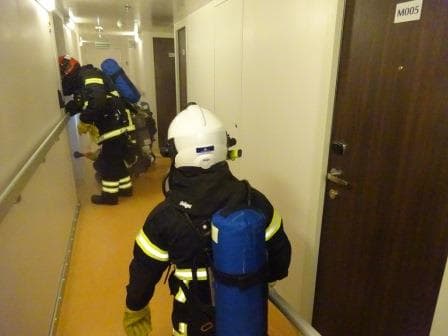
The Fire team lining up before making an entry. The teamleader is still standing up as he tries to get the key in the lock. Then he will hide behind the nozzleman to be protected. Note the good visibility.
While the guests were disappearing ashore, the crew had yet another drill to attend at least about a 100 of them. Those, who are involved with responding to an initial report of a emergency. The greatest danger to a ship is fire and thus we train for anything that could happen in relation to this. So this morning the teams were exposed to a Capt. Albert Special which means a drill with an un-expected twist. The drill set-up consisted of fighting a locker fire, evacuating the area around the locker (about 25 crew cabins) and then go for smoke control to keep smoke and fire away from the rest of the ship. The twist this morning was the little issue of having much more smoke billowing out than anybody was expecting. We are using stage smoke for our drills which makes it possible for me as an observer to remain in the smoke for the whole period. The teams wear SCUBA and they are not affected by any kind of smoke as long as their masks are sealed tight and their fire man’s suits properly zipped up.
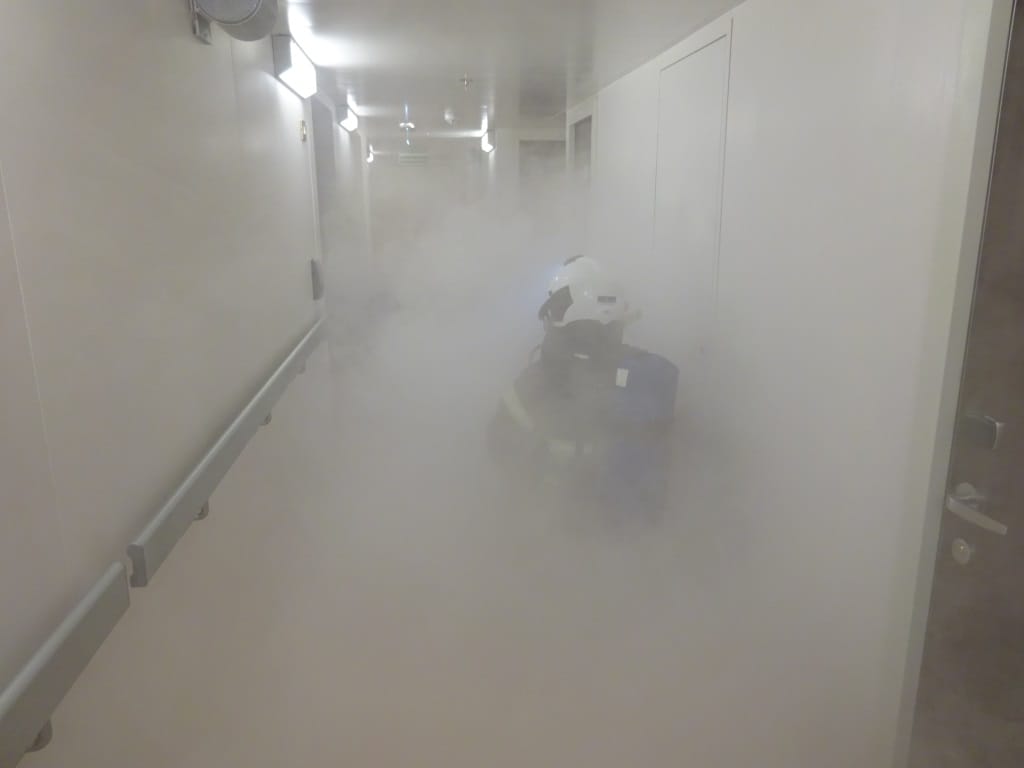
This is two minutes after the first entry was made and it got only worse from there onwards with smoke.
Why does a lot of smoke make a difference? It disorientates everybody. As long you can see something you have a reference point to work from. The moment you lose such a reference point you suddenly feel very alone in a small white world. To avoid this issue we train our crews to focus on their hose. It is their protection against the fire and it is their lifeline for getting away from the danger area they are working in. The team going in performed well and the fire was located and subsequently extinguished. After each drill there is always a debriefing to discuss the good points but also lessons learned. Our lesson learned today was, that we found the best way for this particular area for getting rid of the smoke as quickly as possible.
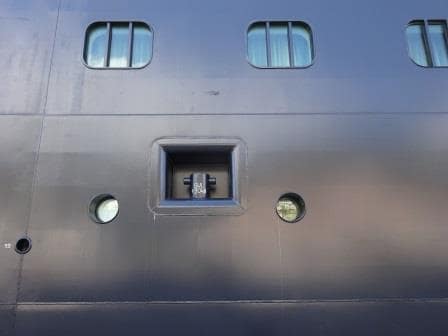
The Dutch Bollard in a recess in the side. They can be reached from tug boat deck level. The white letters on the side indicate the strength of the bollard and how hard a tugboat can pull.
Catching up with yesterday’s walk along the outside of the ship; we are now moving further aft and away from the mid ships. At several locations in the hull we have recesses with a bollard inside. These are called Dutch Bollards. (I have no idea why the name is and why not a French bollard or a German bollard ???) They were first installed on the Statendam in 1992. The logic behind it was to help the tugboats in the Panama Canal for tying up. They do so but not that often. Normally they take a line from the bow or the stern or push in the side. But the tugboats in the rest of the world love it as well. Subsequently all our following ships have had them and thus also the Koningsdam. It has my blessing as it is much more preferable to have a tugboat crew tie the tug up themselves than the sailors having to handle the heavy lines high up on the mooring decks.
Further aft, we have the novelty which only the Koningsdam has in our fleet. A staircase, running outside the ship with a glass floor. There is one on both sides of the ship. I believe it was a Princess ship who had the first glass bottom walkway outside the ship and Holland America morphed this into a staircase.
Finally we then come to the stern of the ship and here the most obvious item is the ducktail. In an earlier blog I already mentioned the reason for this contraption. This serves the dual purpose of enhancing the stability of the ship as it increases the surface contact of the ship and it helps with consuming less fuel. When the ship speeds up, the stern sinks in, a normal phenomenon we call squat. The ducktail lets the stern “sit” on the water instead of having it sink in. In a similar way as a spoiler does on race cars.
Today we are visiting another port. At 6 pm. when we leave we will hop across to Sarande in Albania, a port you can see from the dock in Corfu. Here we will make an evening call, and guests who are interested can hop in the tender and have a walk along the boulevard. I am keeping my fingers crossed as the wind currently blowing is not ideal for a tender call at Sarande so we need a little bit of luck with the wind angle being behind the mountains and those mountains keeping the anchorage area sheltered from waves and chop.
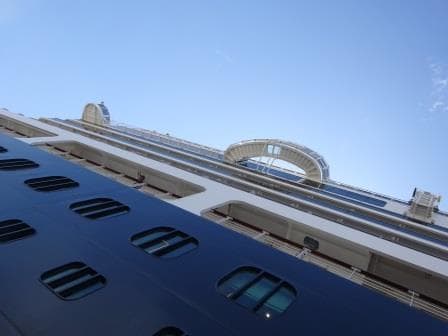
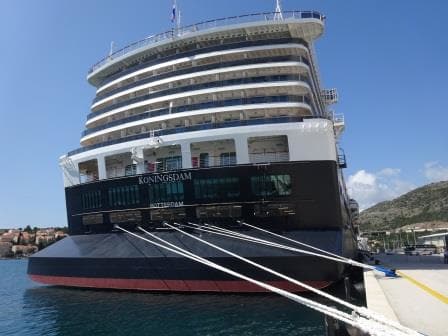

April 11, 2016 at 3:15 pm
Dear Captain,
On the last picture I miss the round things around the ropes that were visible in a previous picture. I read that those are to prevent nasty animals from climbing aboard, is that right?
Thanks,
Arjan
April 12, 2016 at 1:59 am
Good morning thank you for reading my blog.
Sharp observation. Yes the Rat – Guards have to be there, and they were installed shortly after I took the photo. Directly after arrival a sailor goes ashore with a little trolley and installs the Rat Guards on all the mooring lines.
Best regards
Capt. Albert
April 11, 2016 at 5:28 pm
I noticed that the Konigsdam does not have the “outside” elevators. Is there a reason for this?
April 12, 2016 at 1:57 am
Good morning,
Thank you for reading my blog. The company decided to move away from those elevators as the found it was something that should stay with the Vista class and made the Pinnacle Class totally different.
Best Regards
Capt. Albert.
April 12, 2016 at 5:10 am
Here we are , sitting at a Greek bar, with a beer and looking across at the Magnificent Koningsdam.. Absolute bliss.
The ship is wonderful. Run to your travel agent and join us.
Sandra and John
April 12, 2016 at 7:40 pm
Many thanks again, Captain, for taking your readers outside along the full length of the new ship. In one of your first blog entries you mentioned something about how the crew is having to navigate inside the ship over the whole length during working hours.
How does the crew move about, Captain? Are there occasions that an officer has to move from the front all the way to the back or v.v.?